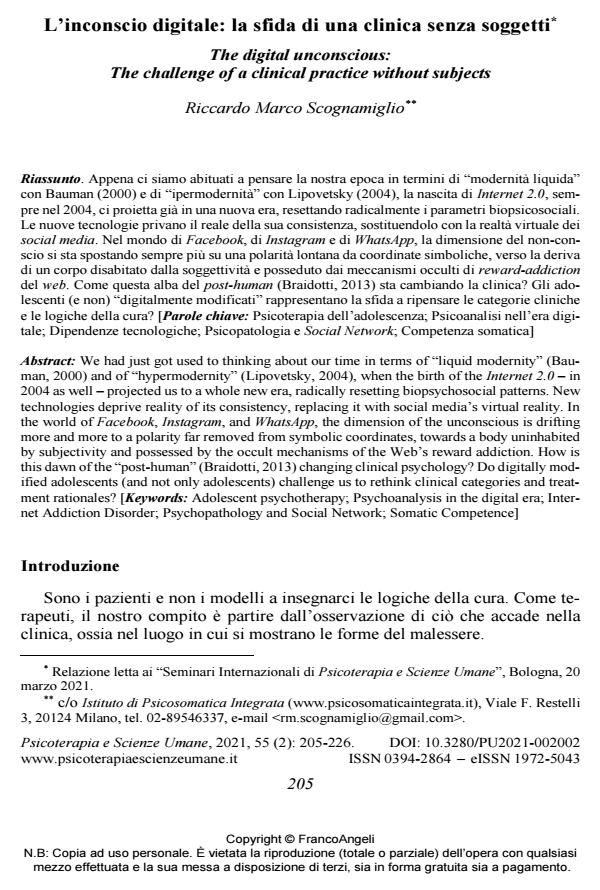The digital unconscious: The challenge of a clinical practice without subjects
Journal title PSICOTERAPIA E SCIENZE UMANE
Author/s Riccardo Marco Scognamiglio
Publishing Year 2021 Issue 2021/2
Language Italian Pages 22 P. 205-226 File size 479 KB
DOI 10.3280/PU2021-002002
DOI is like a bar code for intellectual property: to have more infomation
click here
Below, you can see the article first page
If you want to buy this article in PDF format, you can do it, following the instructions to buy download credits

FrancoAngeli is member of Publishers International Linking Association, Inc (PILA), a not-for-profit association which run the CrossRef service enabling links to and from online scholarly content.
We had just got used to thinking about our time in terms of "liquid modernity"(Bauman, 2000) and of "hypermodernity" (Lipovetsky, 2004), when the birth of the Internet 2.0 - in 2004 as well - projected us to a whole new era, radically resetting biopsychosocial patterns. New technologies deprive reality of its consistency, replacing it with social media’s virtual reality. In the world of Facebook, Instagram, and WhatsApp, the dimension of the unconscious is drifting more and more to a polarity far removed from symbolic coordinates, towards a body uninhabited by subjectivity and possessed by the occult mechanisms of the Web’s reward addiction. How is this dawn of the "post-human" (Braidotti, 2013) changing clinical psychology? Do digitally modified adolescents (and not only adolescents) challenge us to rethink clinical categories and treatment rationales?
Keywords: Adolescent psychotherapy; Psychoanalysis in the digital era; Internet Addiction Disorder; Psychopathology and Social Network; Somatic Competence
- Gli ibernati. Dal narcisismo dell'Io al narcisismo del You Riccardo Marco Scognamiglio, in PSICOTERAPIA E SCIENZE UMANE 3/2025 pp.411
DOI: 10.3280/PU2025-003002
Riccardo Marco Scognamiglio, L’inconscio digitale: la sfida di una clinica senza soggetti in "PSICOTERAPIA E SCIENZE UMANE" 2/2021, pp 205-226, DOI: 10.3280/PU2021-002002